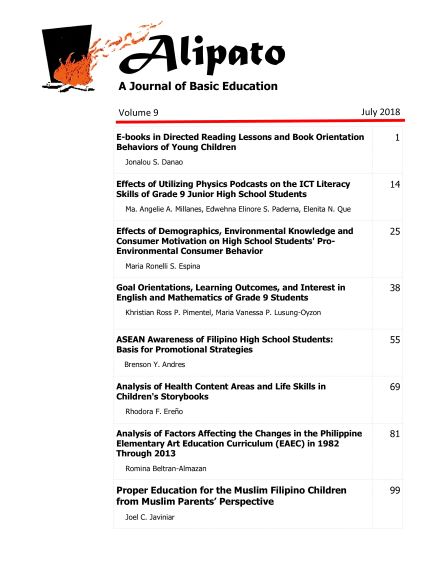-
Ma. Angelie A. Millanes
University of the Philippines Rural High School
-
Edwehna Elinore S. Paderna
College of Education, University of the Philippines Diliman
-
Elenita N. Que
College of Education, University of the Philippines Diliman
Abstract
In this current educational landscape, educators are being challenged to look for innovative ways to teach and integrate various literacy skills essential for the 21st century. As a form of Information and Communications Technology (ICT) tools, podcasting is now an emerging trend in pedagogy because it offers an alternative means of delivering content and enhances the learning and skills of today’s learners. To verify this, the study aimed to determine whether the integration of 13 podcasts episodes as supplementary instructional materials in teaching different physics concepts could yield significant and positive increase on the level of ICT literacy skills among the students. It utilized an experimental pretest-posttest one-group design involving Grade 9 junior high school students from a laboratory school in Laguna, Philippines. A researcher-made instrument called ICT Literacy Skills Inventory (ICTLSI) was administered to the research sample in order to measure the impact of this teaching strategy on student ICT literacy skills, particularly on the following proficiencies: (1) Define, (2) Access, (3) Manage, (4) Integrate, (5) Evaluate, (6) Create, and (7) Communicate. Results showed that there was a positive increment in the pretest and posttest mean scores of the students after the intervention. Furthermore, four out of the seven proficiencies – Define, Access, Evaluate, and Create exhibited a result with significant improvement. It was found out that podcasting is pedagogically powerful in enhancing the level of ICT literacy skills among the students since it provides advantages to complement traditional curriculum delivery.
Keywords: Information and Communications Technology (ICT) literacy skills, instructional material, physics education, podcast
Author Biographies
Ma. Angelie A. Millanes, University of the Philippines Rural High School
Ma. Angelie A. Millanes is a graduate of BS Mathematics and Science Teaching major in Physics from the University of the Philippines (UP) Los Baños where she was given the latin honor, cum laude in 2009. In 2016, she received an academic distinction from the College of Education, UP Diliman after completing her Masters of Education in Physics Education. Currently, is an Assistant Professor at the University the Philippines Rural High School. She is also actively participating in national and international conferences presenting her research papers mainly about physics education, e-learning, and educational technology.
Edwehna Elinore S. Paderna, College of Education, University of the Philippines Diliman
Dr. Edwehna Elinore S. Paderna has degrees in Bachelor of Secondary Education (Chemistry), Master of Arts in Education (Chemistry Education), and Ph.D. in Education (Chemistry Education) from the University of the Philippines. She currently teaches undergraduate and master’s level courses in the Science Education Area, College of Education at the University of the Philippines Diliman. She also conducts trainings for teachers. She has conducted researches on the Level of Scientific Culture among Secondary Students with Faculties of Education of Universiti Kebangsaan Malaysia and Sophia University funded by Japan Foundation and on Keeping Students in STEM through Enrichment Classes funded by USAID through Philippine Business for Education (PBEd). Dr. Paderna has local and international publications. She is currently writing a book chapter for Springer that will be published in early 2019.
Elenita N. Que, College of Education, University of the Philippines Diliman
Elenita N. Que is an Assistant Professor and currently the Program Coordinator of the Educational Technology Area of the UP College of Education. She is the Chair of the Training Working Group of the UNESCO Bangkok Resource Distribution and Training Centres (RDTC) and Acting Executive Director of Comparative Education Society of the Philippines. She finished her Master of Education major in Educational Technology degree at the University of the Philippines Diliman in 2000 and completed her Bachelor of Science in Development Communication at the University of the Philippines Los Baños in 1982. Prof. Que is a Digital Literacy Fellow of Queensland University of Technology, Brisbane, Australia, and a doctoral candidate under the Division of Educational Development and Cultural and Regional Studies at Hiroshima University - Graduate School for International Development and Cooperation in Japan.


